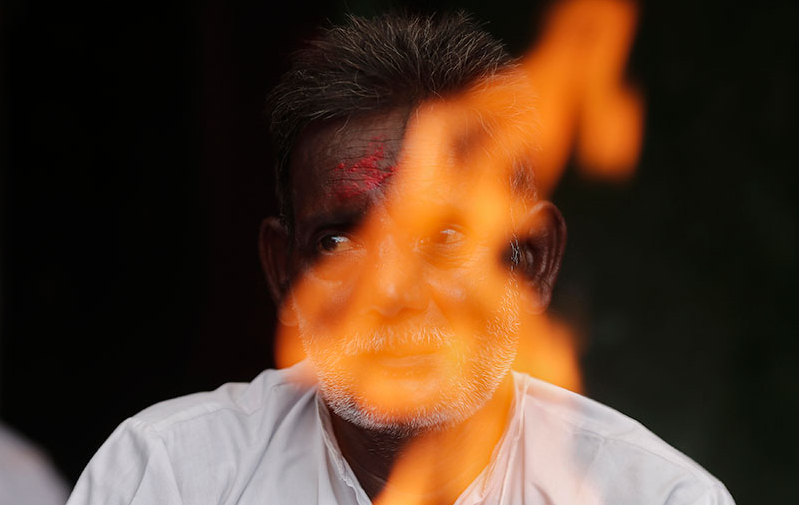
Many people in the West think that India, where the dominant religion is Hinduism, as a place of religious tolerance. However, Christians in that country have challenged that stereotype after 39 of them were "converted" back to Hinduism on Sunday.
According to a report from Times of India, the Viswha Hindu Parishad, or VHP, "converted" 39 people from 11 Dalit Christian families to Hinduism through the controversial "ghar wapsi" program in the Indian state of Kerala. They made the Christians go through a "purification" process and made them recite Gayathri Manthra as the final step of the Hindu ritual.
"We are moving ahead with our initiative and more families from other religions will be reconverted to Hinduism soon," said VHP Alappuzha district chief Prathap G. Padickal, the main organizer of the event. "We are being approached by many people who want to come back to their original faith."
Times of India reported that Dalit Christians mostly "belong to Pentecostal and other non-Catholic and non-Syrian Christian denominations." However, the VHP targets them because they "are denied reservations that Hindu Dalit communities" have.
"We do not want to give any importance to this issue. So we want to keep away from commenting on this program," a spokesperson for Alappuzha Bishop Stephen Athipozhyil said.
According to John Allen Jr. of Crux, India's Christian minority has stated that things have become "considerably worse" since a political party called the BJP came into power in May 2014. The BJP has the backing of fundamentalist Hindu movements.
"Christians comprise around 2.5 percent of the national population, though some put it as high as 4 to 6 percent if house churches and independent movements are counted," Allen wrote. "India is so huge, however, that even the low-end estimate works out to almost 25 million people."
Allen reported that a cross-section of Christian leaders launched a movement called the United Christian Forum for Human Rights to respond to reports of persecution. Activist John Dayal elaborated on the initiative during a press conference.
"2014 was a particularly traumatic year," Dayal said. "It was conceived in sin, in a campaign based on hate."
Dayal noted that the persecution of Christians in India predated the BJP's victory in India's national elections last year.
"Since 1997, we have been recording between 150 and 350 cases of violence a year," Dayal said. "It doesn't matter who runs the government ... the non-state actors and the problems with the criminal justice system remain the same."
According to Crux, many Christians in India referred to an incident that happened in eastern India back in August 2008. During that time, Hindus blamed Christians for the assassination of a revered Hindu spiritual leader in the Indian state of Orissa (Odisha), even though the real culprit was "most likely by Maoist guerillas."
"In an orgy of violence that quickly spread to 600 villages, half of the 100,000 Christians in the area found themselves homeless, forced to seek refuge in a nearby forest," Allen wrote. "Some 120 Christians are believed to have been killed, some of them hacked to death by machete-wielding radicals. Three hundred churches were burned along with 6,000 private homes."
Allen added that at least three women, including a Catholic nun, were gang-raped during the outbreak of violence. Other Christians have died of either starvation or snakebite while waiting to return to their homes in Orissa.
"Out of 120 killed, there have been only two convictions," Allen said, highlighting the lack of justice for the victims of Orissa. "One was a life sentence for murder, and one just seven years for abduction ... as if nobody killed the rest of them."
According to Crux, between 60 and 75 percent of India's Christians come from the Dalit community, which under the country's old caste system ranked them as "untouchables." Allen reported that unlike other forms of Christian persecution around the world, India's version was not fueled by radical Islam.
"India is a vibrant democracy and among the emerging superpowers of the early 21st century, with a constitution that guarantees religious freedom, though that's hardly the reality on the ground," Allen wrote.
Despite the threats of persecution, Dayal indicated that India's Christians plan to stand up for themselves and not passively accept their plight.
"We claim our rights as children of God and as citizens of the state, with the Bible in one hand and the constitution in the other," Dayal said.







